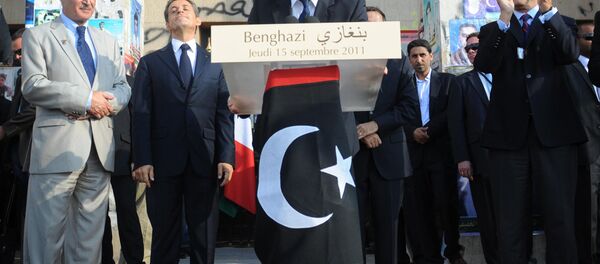Following Cameron's retirement from politics earlier this week, the Foreign Affairs Select Committee provided a damning verdict to the former PM's military intervention in Libya, finding that Cameron was "ultimately responsible" for the country's descent into post-conflict chaos.
We have published our report on #Libya. Read it here: https://t.co/f7mPMrP5Yj
— Foreign Affairs Ctte (@CommonsForeign) September 13, 2016
While many have long criticized the effects of the UK, US and French-led mission, the parliamentary committee highlighted some of Cameron's biggest mistakes that have contributed to five-years of war and political instability in Libya.
Poor intelligence
Chief among the criticisms was the poor intelligence Cameron relied upon in the lead-up to the 2011 intervention.
The report criticized how the UK had "overstated" fears about the threat then Libyan leader Muammar Gaddafi posed to his citizens, and how decisions taken on how to approach the conflict "were not based on accurate intelligence."
Cameron ignored/manipulated intelligence to bomb Libya. Heard this before? pic.twitter.com/KmQIeaDhGx
— Ernie Warrender (@ErnieWarrender) September 14, 2016
"In particular, the Government failed to identify that the threat to civilians was overstated and that the rebels included a significant Islamist element," the report concluded.
The inability to identify moderate government protestors from Islamist elements was seen as a factor in the rise of Islamist violence in Libya, with the committee's chair Crispin Blunt saying the campaign "was founded on erroneous assumptions and an incomplete understanding of the country and the situation."
From Protecting People to Regime Change
Another severe criticism of the Cameron's government actions in Libya was how the military campaign shifted from being a plan that intended to protect to civilians, to one that was determined to overthrow Gaddafi and ensure regime change in the country.
The committee questioned the international coalition's actions in Libya following the initial military campaign.
Spreading 'democracy' is not just about a military intervention and a regime change #libya
— Donjeta Miftari (@miftaridonjeta) September 14, 2016
"If the primary object of the coalition intervention was the urgent need to protect civilians in Benghazi, then this objective was achieved in March 2011 in less than 24 hours," the report found.
"This meant that a limited intervention to protect civilians drifted into an opportunist policy of regime change by military means."
If #Cameron is guilty of 'opportunist regime change' then he is guilty of a war crime #r4today
— Michael Abberton (@MichaelAbberton) September 14, 2016
Blunt also noted that "other political options" apart from regime change were available in the country.
"Political engagement might have delivered civilian protection, regime change and reform at a lesser cost to the UK and Libya. The UK would have lost nothing by trying these instead of focusing exclusively on regime change by military means."
Poor Post-Conflict Planning
While poor intelligence and a seemingly unstated aim to implement regime change in Libya led to widespread destabilization, the report also criticized the UK's inability to implement a coherent post-conflict strategy to prevent Libya from spiraling into conflict and political chaos.
The criticism follows comments made earlier this year by US President Barack Obama, who said that Britain and France had not done enough to "follow-up" on the conflict, with an estimated US$39.5 billion (£30 billion) worth of ammunition falling into the hands of extremist groups and jihadist movements like Daesh.
Cameron: "Yes, but apart from those things, it's clear that intervening in Libya was a great success." #legacy pic.twitter.com/LX1jZLKwDC
— David Schneider (@davidschneider) September 14, 2016
"The international community's inability to secure weapons abandoned by the Gaddafi regime fuelled instability in Libya and enabled and increased terrorism across north and west Africa and the Middle East," the report said.
In conclusion, Blunt said that the UK "had a responsibility to support Libyan economic and political reconstruction."
People who say Cameron's entire legacy is Brexit are wrong. He also extended the slump, threw thousands into homelessness & trashed Libya.
— Adam Ramsay (@AdamRamsay) September 14, 2016
"But our lack of understanding of the institutional capacity of the country stymied Libya's progress in establishing security on the ground and absorbing financial and other resources from the international community.
"The UK's actions in Libya were part of an ill-conceived intervention, the results of which are still playing out today."





